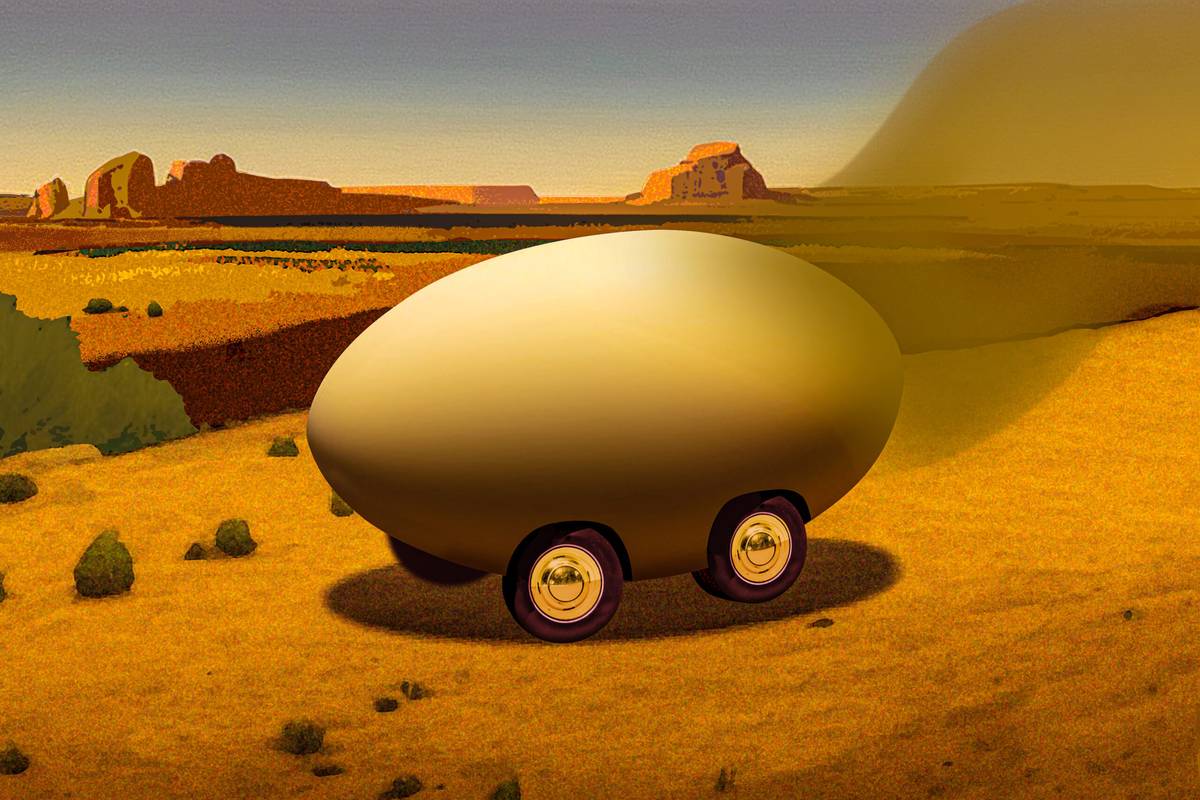Why Does My Car Smell Like Rotten Eggs?

Nobody likes driving a smelly car, especially if it smells like somebody left a carton of eggs in the backseat for a week during the summer. So, why might your car smell like rotten eggs? While there are other potential causes of a sulfur smell around your car, the most likely is probably a faulty catalytic converter.
Related: What’s a Catalytic Converter and Why Do People Steal Them?
A Catalytic Converter Gone Bad
Catalytic converters were introduced for the 1975 model year to reduce exhaust pollutants and are still in use today. Your car may even have more than one.
Roughly the size of a loaf of bread, catalytic converters are located in the exhaust system between the engine and the muffler. They typically have metal shields above and below them, as they get very hot. Sometimes referred to as simply the “cat,” they use a catalyst (something that speeds up a chemical reaction — in this case, precious metals including platinum) to convert harmful exhaust pollutants into less harmful substances, hence the name.
If you’re detecting a rotten-egg smell, it’s likely an indication the catalytic converter isn’t doing its job. The scent would probably be strongest at the end of the tailpipe at the back of the car, but the smell could also make its way through any gap in the exhaust system after the catalytic converter, possibly giving it a more direct path to the interior.
What causes the rotten-egg smell is hydrogen sulfide, a derivative of sulfur. The catalytic converter is supposed to convert this into odorless sulfur dioxide, but a failure within the converter can prevent it from doing so.
According to the Centers for Disease Control and Prevention, hydrogen sulfide can be hazardous to your health, so you want to avoid breathing it. If you smell rotten eggs in your car, try to open the windows and get the problem taken care of as soon as possible. A malfunctioning catalytic converter can also overheat, potentially causing a fire.
What Causes a Catalytic Converter to Fail?
While a catalytic converter could last the life of the car, it could also meet an early demise if something related to the engine goes wrong or if it’s crushed or damaged by driving over a curb or big pothole.
In terms of engine-related problems, anything that sends a rich fuel mixture or raw gas to the converter can cause it to overheat and become damaged, as the gas can burn inside the converter. Often, whatever is causing the rich fuel mixture or raw gas will trigger the check-engine light (in some cars, it’s a “Service Engine Soon” light or warning), and the engine may also run poorly, produce less power than usual or get lower fuel economy. You may also see black smoke coming out the exhaust pipe.
The catalytic converter can also be damaged if the engine is leaking oil or coolant into the cylinders. This would likely be due to worn piston rings or valve seals for oil, or bad head gaskets for coolant. These fluids would be burned in the cylinder and flow with the exhaust to the catalytic converter, where they could coat the converter’s internal components, making them unable to do their “converting” job and possibly clogging them up. Burning oil will usually produce blue exhaust smoke, while burning coolant can produce white exhaust smoke.
What’s most important is that whatever is wrong with the engine must be corrected before replacing the catalytic converter — which you’ll most likely have to do — or it will just destroy the new one. However, there’s a possibility that just repairing the engine issues may solve the problem, perhaps with the help of driving the car at highway speeds for a couple of hours to burn off the contaminants.
More From Cars.com:
- Why Does My Car Smell Like Gas?
- When Should the Oxygen Sensor Be Replaced?
- How to Change a Car Battery
- Why Is My Car Leaking Oil or Another Fluid?
- More Service Articles
Other Potential Causes of a Rotten-Egg Smell
Your car could smell like rotten eggs because of the battery or transmission fluid, as both contain (or may contain) some derivative of sulfur.
A car battery is filled with sulfuric acid, and if the battery leaks, you may notice a rotten-egg smell when you open the hood. If so, you should check the battery to see if it’s leaking.
Transmission fluid can also contain some form of sulfur. If it leaks out — particularly if it leaks onto another component underneath the car — it may give off a rotten-egg smell. You will likely have to put the car up on a lift to check it.
However, both of these possibilities would likely be unusual and also subtle, though fumes from either could find their way through the car’s ventilation system and into the interior.
Another slim possibility is that you got a bad tank of gas. And a really long shot is that it could be coming from, well, rotten eggs.
Related Video:
Cars.com’s Editorial department is your source for automotive news and reviews. In line with Cars.com’s long-standing ethics policy, editors and reviewers don’t accept gifts or free trips from automakers. The Editorial department is independent of Cars.com’s advertising, sales and sponsored content departments.
Featured stories




